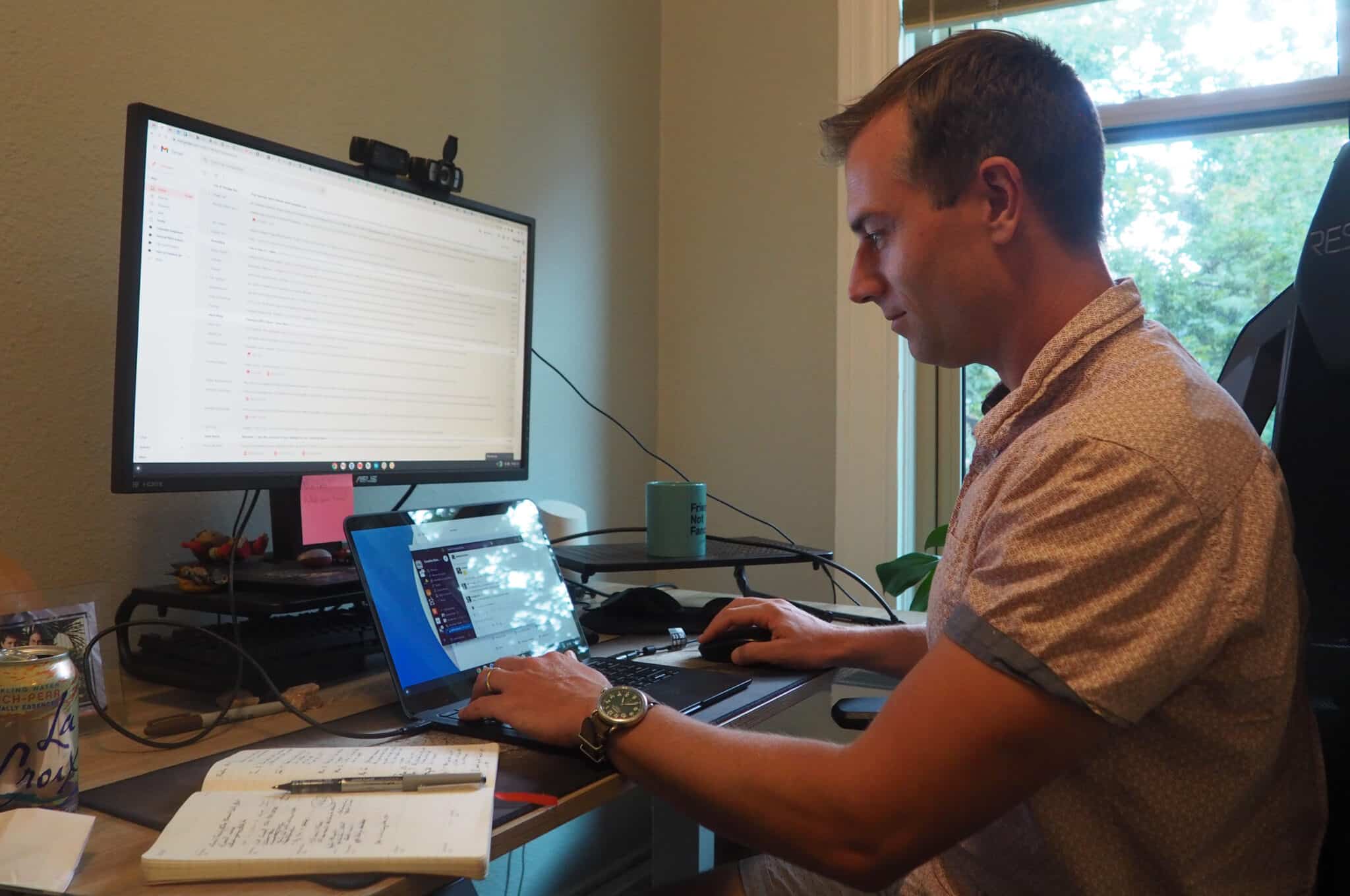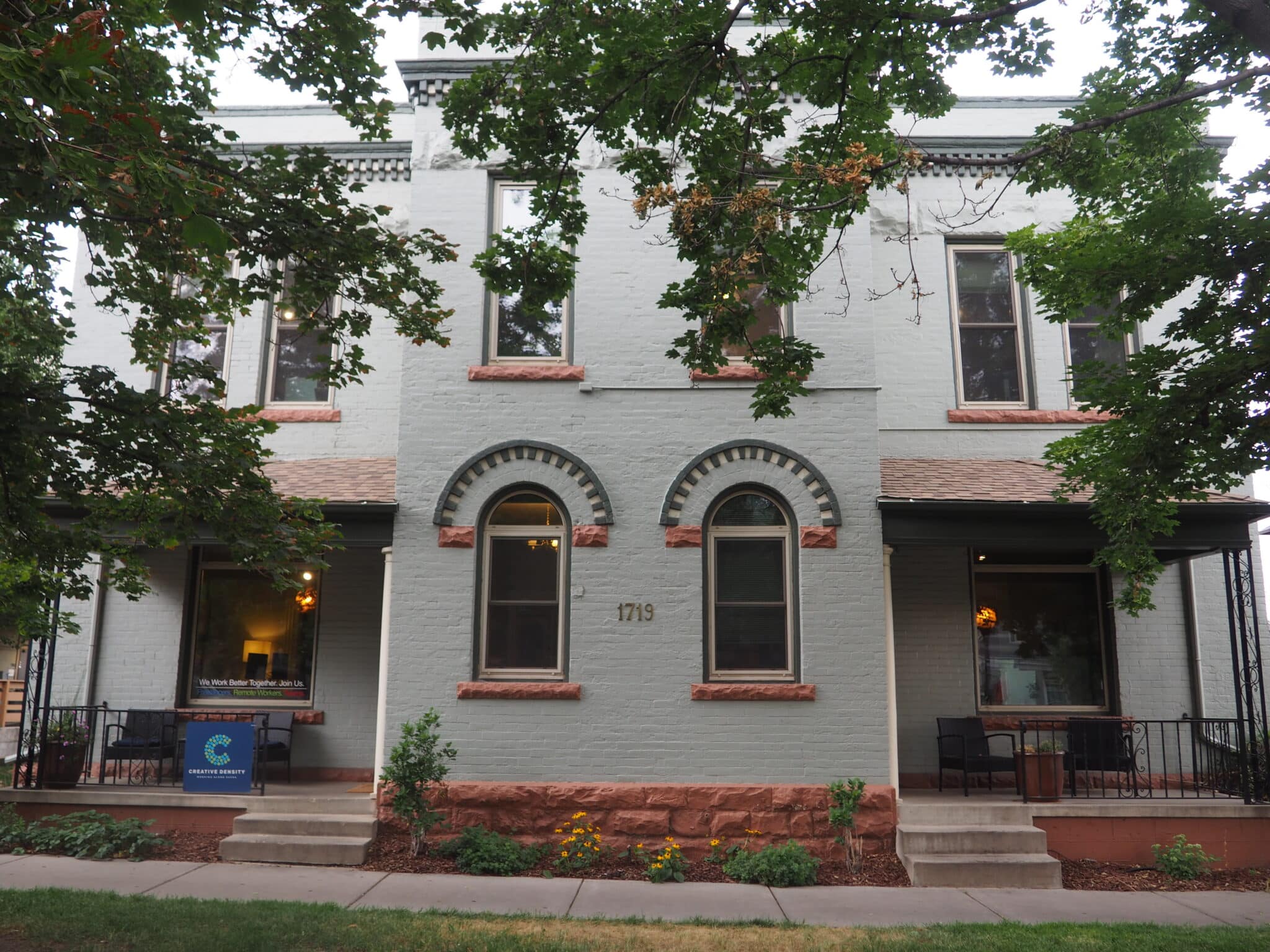
Creative Density founder Craig Baute said he can’t afford to buy the property at 1719 N. Emerson St. when the landlord puts it up for sale. (Matthew Geiger photos)
One of Denver’s longest running coworking companies expects to move out of its original location.
Creative Density launched at 1719 N. Emerson St. in Uptown in 2011. It’s since grown and added locations around Denver in Lone Tree, Cap Hill, Sunnyside and Park Hill.
But the company doesn’t own any of the real estate and the landlord of the Emerson Street space is looking to sell the property.
Creative Density founder Craig Baute said his landlord told him that the building, a duplex-turned-office space built in 1933, will be listed at $1.1 million. He said it’s a price he can’t afford to pay and thinks is well above market rate.
Unless Creative Density purchases the property, which Baute said is unlikely, the business will be moving out, he said.
For comparison, the same property was listed back in 2009 at $595,000, according to an old LoopNet posting. The space was previously one of the first medical marijuana dispensaries in Denver during the late 2000s, Baute said.
Eileen Hyatt, the owner of the property, issued a brief statement to BusinessDen and declined to comment further. Hyatt ran her own business out of the space for roughly 30 years before leasing it to a software company in the early 2000s.
“There is much in flux about the potential sale/lease renewal of this property, and I am not comfortable about sharing at this time,” Hyatt said.
Baute now finds himself in a challenging predicament. He wants to find a new space in Uptown, but said availability is limited, while Upper Downtown — just a few blocks away — has tons of open buildings. He wants to avoid moving downtown, though, since it doesn’t suit his clientele.
Creative Density aims to create spaces that foster interaction between workers at various companies, as opposed to just providing blocks of space for small businesses to operate, Baute said.
“The next evolution is really neighborhood co-working spaces. And so what I really mean by that is 10,000 square feet or less,” he said, adding that the setup allows people to easily walk or bike to their workspace.
Creative Density’s business model has historically relied on subleases for small spaces in the “ring neighborhoods” surrounding downtown Denver, Baute said. He also is on the hunt for a location in Lakewood.
Baute said Creative Density also uses “management contracts” for some of its locations. In those cases, the business gives a cut of its revenue to the property owner in exchange for the space.
No upfront costs are involved, and the setup allows the property owner to focus on being a property owner while Creative Density focuses on being a coworking space.
“There’s less risk, and there’s less reward,” Baute said.
Baute said he’d prefer to do management contracts for future locations.
“That’s where we’re adaptable. We can move into so many other different properties. Because our people, they just like hanging out with each other. They’re not looking into an office to rent. They just want a whole bunch of rooms and there’s so many places that have tried to do traditional coworking over the last five or six years in Denver, but they haven’t been able to make it,” he said.

Creative Density founder Craig Baute said he can’t afford to buy the property at 1719 N. Emerson St. when the landlord puts it up for sale. (Matthew Geiger photos)
One of Denver’s longest running coworking companies expects to move out of its original location.
Creative Density launched at 1719 N. Emerson St. in Uptown in 2011. It’s since grown and added locations around Denver in Lone Tree, Cap Hill, Sunnyside and Park Hill.
But the company doesn’t own any of the real estate and the landlord of the Emerson Street space is looking to sell the property.
Creative Density founder Craig Baute said his landlord told him that the building, a duplex-turned-office space built in 1933, will be listed at $1.1 million. He said it’s a price he can’t afford to pay and thinks is well above market rate.
Unless Creative Density purchases the property, which Baute said is unlikely, the business will be moving out, he said.
For comparison, the same property was listed back in 2009 at $595,000, according to an old LoopNet posting. The space was previously one of the first medical marijuana dispensaries in Denver during the late 2000s, Baute said.
Eileen Hyatt, the owner of the property, issued a brief statement to BusinessDen and declined to comment further. Hyatt ran her own business out of the space for roughly 30 years before leasing it to a software company in the early 2000s.
“There is much in flux about the potential sale/lease renewal of this property, and I am not comfortable about sharing at this time,” Hyatt said.
Baute now finds himself in a challenging predicament. He wants to find a new space in Uptown, but said availability is limited, while Upper Downtown — just a few blocks away — has tons of open buildings. He wants to avoid moving downtown, though, since it doesn’t suit his clientele.
Creative Density aims to create spaces that foster interaction between workers at various companies, as opposed to just providing blocks of space for small businesses to operate, Baute said.
“The next evolution is really neighborhood co-working spaces. And so what I really mean by that is 10,000 square feet or less,” he said, adding that the setup allows people to easily walk or bike to their workspace.
Creative Density’s business model has historically relied on subleases for small spaces in the “ring neighborhoods” surrounding downtown Denver, Baute said. He also is on the hunt for a location in Lakewood.
Baute said Creative Density also uses “management contracts” for some of its locations. In those cases, the business gives a cut of its revenue to the property owner in exchange for the space.
No upfront costs are involved, and the setup allows the property owner to focus on being a property owner while Creative Density focuses on being a coworking space.
“There’s less risk, and there’s less reward,” Baute said.
Baute said he’d prefer to do management contracts for future locations.
“That’s where we’re adaptable. We can move into so many other different properties. Because our people, they just like hanging out with each other. They’re not looking into an office to rent. They just want a whole bunch of rooms and there’s so many places that have tried to do traditional coworking over the last five or six years in Denver, but they haven’t been able to make it,” he said.

